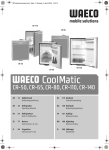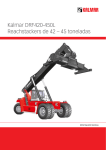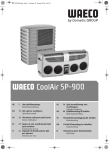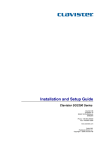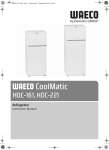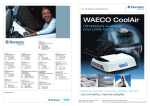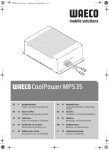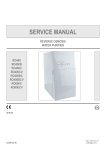Download Waeco RPD-175 Instruction manual
Transcript
CoolMatic RPD-175, RPD-215 Refrigerator Instruction manual M_101101_RPD_R1.indd 1 10/12/10 2:36 PM RPD-175, RPD-215 1 RPD-175 2 M_101101_RPD_R1.indd 2 10/12/10 2:36 PM RPD-175, RPD-215 2 RPD-215 3 M_101101_RPD_R1.indd 3 10/12/10 2:36 PM RPD-175, RPD-215 3 ∅/mm² 12 V 24 V 14 10 6 2 0 0 2 4 6 8 10 12 14 16 18 20 22 24 26 28 l/m VIEW A 4 3 VENTILATION HOLES 4 50 min 2 VIEW A 1 1 5 2 POWER 3 STATUS 4 COLD 1 2 3 4 5 COLDEST ON/OFF 4 M_101101_RPD_R1.indd 4 10/12/10 2:36 PM RPD-175, RPD-215 Please read this manual carefully before starting the machine. Keep it in a safe place for future reference. If the device is resold, this operating manual must be handed over to the purchaser along with the device. Contents 1 Notes on using the instruction manual 5 2 Safety instructions 6 3 Scope of delivery 7 4 Intended use 8 5 Technical description 8 6 Installing and connecting the refrigerator 8 7 Using the refrigerator 13 8 Cleaning and maintenance 20 9 Guarantee 20 10 Disposal 20 11 Troubleshooting 21 12 Technical data 23 1 Notes on using the instruction manual The following symbols are used in this instruction manual: Caution! Safety instruction: failure to observe this instruction can cause injury or damage the device. Caution! Safety instruction relating to a danger from an electrical current or voltage. Failure to observe this instruction can damage the device and impair its function and cause injury. Note Supplementary information for operating the device. ➤ Action: this symbol indicates that action is required on your part. The required action is described step-by-step. ✓ This symbol indicates the result of an action. 5 M_101101_RPD_R1.indd 5 10/12/10 2:36 PM RPD-175, RPD-215 Safety instructions 4 1, page 4: this refers to an element in an illustration. In this case, item 1 in figure 4 on page 4. Please observe the following safety instructions. 2 Safety instructions Caution! Dometic International will not be held liable for claims for damage resulting from the following: – Damage to the device resulting from mechanical influences and overvoltage – Alterations to the device made without the explicit permission of Dometic International – Usage for purposes other than those described in the installation manual 2.1 General safety ● Have a trained technician make installations in wet rooms. ● Do not operate the device if it is visibly damaged. ● This device may only be repaired by qualified personnel. Inadequate repairs can lead to considerable hazards. Should your device need to be repaired, please contact WAECO customer services. ● Do not open the refrigerant circuit under any circumstances. ● Place the device in a dry location where it is protected against splashing water. ● Do not place the device near naked flames or other heat sources (heaters, direct sunlight, gas ovens etc.). ● Ensure that the ventilation slots are not covered. ● The device is not suitable for storing caustic materials or materials containing solvents. ● Before starting up the device for the first time, check whether the operating voltage and the battery voltage correspond (see type plate). ● Danger of fatal injuries! When using the device on boats: if the device is powered by the mains, ensure that the power supply has a ground fault interrupter circuit. 6 M_101101_RPD_R1.indd 6 10/12/10 2:36 PM Scope of delivery 2.2 RPD-175, RPD-215 ● Food may only be stored in its original packaging or in suitable containers. ● If the cable is damaged, it must be replaced to prevent possible electrical hazards. Only replace a damaged power cable with a power cable of the same type and specifications. Operating the device safely ● Electronic devices are not toys. Always keep and use the device out of the reach of children. ● If you connect the device to a battery, make sure that food does not come into contact with the battery acid. ● Protect the device against rain and moisture. ● Disconnect the cooling device and other power consuming devices from the battery before connecting the battery to a quick charging device. Overvoltage can damage the electronics of the device. ● 3 Danger of fatal injuries! Do not touch exposed cables with your bare hands. This especially applies when operating the device with an AC mains power supply. Scope of delivery Quantity Description 1 Refrigerator 1 Instruction manual 1 LH hinge conversion kit (with instruction) 2 Airing position card 7 M_101101_RPD_R1.indd 7 10/12/10 2:36 PM RPD-175, RPD-215 4 Intended use Intended use The refrigerator is suitable for cooling and freezing foodstuffs. The device is also suitable for use on boats. If you wish to cool medicines, please check if the cooling capacity of the device is suitable for the medicine in question. 5 Technical description The refrigerator is suitable for use with a 12 V or 24 V DC voltage and can therefore also be used for mobile homes, caravans or on boats. When used on boats the refrigerator can be subjected to a constant inclination of 30°. It can cool products to +10 °C to +2 °C and keep them cold. In the freezer compartment, it can cool products to –18 °C and freeze them. All materials used in the refrigerator are compatible for use with foodstuffs. The refrigerant circuit is hermetically sealed and CFC-free. You can use the variable thermostat to set the desired temperature. 6 Installing and connecting the refrigerator Safety instructions for installation on boats Please not the following instructions for installation on boats: – The device can be tilted sideways up to 30º. When setting up the refrigerator, note that it must be fastened to take account of this. If you have any questions regarding installation consult your specialist dealer. – Install the refrigerator so that the warm air produced can easily flow away either upwards or to the front (at top), fig. 4 page 4. – If appliance is powered by mains, ensure that the power supply has a residual current circuit breaker. – Observe all the other installation instructions in this section. 6.1 Securing the refrigerator Caution! – Fasten the device as described in the operating manual to prevent hazards. 8 M_101101_RPD_R1.indd 8 10/12/10 2:36 PM Using the refrigerator RPD-175, RPD-215 – Keep objects clear of openings in the housing or mounting structure (such as ventilation slots). – The refrigerator is designed for installation in a fitted niche. Once it is installed, only the front of the appliance may be accessible. Set up the fridge in a dry, sheltered place. Avoid placing it near heat sources such as radiators, gas ovens, hot water pipes etc. Do not let it stand in direct, strong sunlight. After the refrigerator is put in place, it is to be secured in the enclosure with screws. (These screws are not included). The six screws have to be installed in the following order. 1.a) The refrigerator is provided with a lower front strip (shipped as a loose part) which is to be attached after the refrigerator is set into the cutout opening. Install the lower front strip by sliding it under the bottom hinge plate and swing it into place. (The hinge plate can be on the right or left side depending on the door swing.) 1 1.b) Secure the refrigerator and the lower front strip with two screws: One screw through the hinge and on the opposite side, one screw through the lower front strip. 9 M_101101_RPD_R1.indd 9 10/12/10 2:36 PM RPD-175, RPD-215 Using the refrigerator 2. Install two screws in the top frame. 3. Install two screws in the rear base. 2 3 6.2 Drain water hose The condensation which forms during normal operation of the refrigerator needs to be drained to the outside. A hole must be drilled through flooring. The installer has to make sure that the hose does not kink when run through the floor. Seal around the hose that goes through the drilled hole. If a longer hose than supplied is required to get the water to drain outside of the vehicle, the installer will have to supply the extra length of hose. Water hose Hole for draining water hose 10 M_101101_RPD_R1.indd 10 10/12/10 2:36 PM RPD-175, RPD-215 6.3 Ventilation The refrigerator must be installed so that the warm air produced can easily flow away. Therefore make sure there is adequate ventilation ( fig 4 , page 4). 4 No. in fig 6.4 page 4 Explanation Action 1 Cold intake air Fit inlet vent to exterior wall (below “compressor shelf”) 2 Condenser & Compressor (“compressor shelf”) – produce heat – 3 Hot waste air – external vent Fit oulet vent to exterior wall (above “compressor shelf”) 4 Hot waste air – internal vent – Connecting the refrigerator Connecting to a battery The refrigerator can be operated with a 12 V to 24 V DC voltage supply. To avoid voltage loss and therefore a drop in performance, the cable should be kept as short as possible and should not be interrupted if this is possible. For this reason avoid additional switches, plugs or power strips. ➤ Determine the required cross section of the cable in relation to the cable length according to 3 page 4. Key for 3 page 4 Co-ordinate axis Meaning Unit I Cable length mm ø Cable cross-section mm2 11 M_101101_RPD_R1.indd 11 10/12/10 2:36 PM RPD-175, RPD-215 Caution! Make sure that the polarity is correct. ● Before starting up the device for the first time, check whether the operating voltage and the battery voltage correspond (see type plate). ➤ Connect the refrigerator – As directly as possible to the pole of the battery or – To a plug socket which is fused with at least 15 A (at 12 V) or 7.5 A (at 24 V). Caution! Disconnect the cooling device and other power consuming devices from the battery before connecting the battery to a quick charging device. Overvoltage can damage the electronics of the device. For safety reasons the refrigerator is equipped with an electronic system to prevent the polarity being reversed. This protects the refrigerator against reversed polarity when connecting to a battery and against short circuiting. To protect the battery, the refrigerator switches off automatically if the voltage is insufficient (see table below). 12 V 24 V Switch-off voltage 10.4 V 22.8 V Switch-on voltage 11.7 V 24.2 V 12 M_101101_RPD_R1.indd 12 10/12/10 2:36 PM RPD-175, RPD-215 7 Using the refrigerator Before starting your new refrigerator for the first time, you should clean it inside and outside with a damp cloth for hygienic reasons (please also refer to 8 “Cleaning and maintenance”. 7.1 Energy saving tips ● Choose a well ventilated installation location which is protected against direct sunlight. ● Allow hot food to cool down first before placing it in the device. ● Do not open the refrigerator more often than necessary. ● Do not leave the door open for longer than necessary. ● Defrost your refrigerator as soon as a layer of ice forms. ● Avoid unnecessarily low temperatures. ● Clean the condensor of dust and impurities at regular intervals. 7.2 Using the refrigerator The refrigerator conserves fresh foodstuffs. The freezer compartment conserves frozen foodstuffs and freezes fresh foodstuffs. Ensure that food or liquids in glass containers are not excessively refrigerated. Liquids expand when they freeze and can thus destroy the glass containers. ➤ Switch the refrigerator on by pressing ON/OFF button ( 5 1, page 4). After switching on, the refrigerator requires approx. 180 seconds until the compressor starts up. Ensure that the objects placed in the refrigerator are suitable for cooling to the selected temperature. 13 M_101101_RPD_R1.indd 13 10/12/10 2:37 PM RPD-175, RPD-215 Power and Status LED’s Power LED The Power LED ( 5 2, page 4) indicates the following conditions: POWER LED Condition Not lit Refrigerator is turned off, or there is no power supply Green Refrigerator is turned on, and the compressor is running Red Refrigerator is turned on, and the compressor has cycled off Status LED The Status LED ( 5 3, page 4) indicates the following conditions: STATUS LED Condition Not lit Refrigerator is running normally Flashing Red There is a problem. See Troubleshooting Guide Setting the temperature You can set the temperature in levels using the button ( 5 4, page 4) . The integrated thermostat regulates the temperature as shown in the following table. Level Meaning 1 Minimum cooling capacity (warmest) 5 Maximum cooling capacity (coldest) The cooling capacity can be influenced by: – The ambient temperature – The amount of food to be conserved – The frequency with which the door is opened. 14 M_101101_RPD_R1.indd 14 10/12/10 2:37 PM RPD-175, RPD-215 Conserving foodstuffs You can conserve foodstuffs in the refrigerator compartment. The time for which the food can be conserved in this way is usually stated on the package. Caution! Do not conserve warm food in the refrigerator compartment. Do not place glass containers with liquid in the freezer compartment. Food which can easily absorb tastes and odours and liquids and products with a high alcohol content should be conserved in airtight containers. ● You can keep frozen food in the freezer compartment for several months as temperatures of down to -18ºC are achieved in this area. ➤ Observe the following when using the device: – Do not re-freeze products which are defrosting or have been defrosted, consume them as soon as possible. – Each individual drawer and shelf can bear an evenly divided load of max. 20 kg. – Wrap food in aluminium foil or cling film and shut-in in a suitable box with a lid. This ensures that aromas, the shape and the freshness are better conserved. Making ice cubes Caution! Do not eat ice cubes or ice cream immediately after removing it from the freezer compartment as this can cause cold burns. Make ice cubes in the freezer compartment in the following manner: ➤ Fill the ice cube trays up to three quarters full with water. ➤ Place the ice cube trays in the freezer compartment. Do not remove containers which have frozen in place to the base of the compartment with sharp or pointed objects. This can damage the refrigerator. 15 M_101101_RPD_R1.indd 15 10/12/10 2:37 PM RPD-175, RPD-215 7.3 Removing and replacing the shelves 1. Remove the shelf locks by inserting the tip of a flat bladed screwdriver into the slot of the locks. Turn the screwdriver counterclockwise and then remove the shelf locks from the wire shelf. 2. Tilt the shelf to one side at an angle while pulling forward. 3. Reposition the shelf in the desired location. Insert the ends of the wire shelf on the left-hand side and slide the shelf into the holes on the right-hand side. 4. Slide the plastic plugs into the holes of the wall. 5. Snap the shelf locks onto the wire shelf. 16 M_101101_RPD_R1.indd 16 10/12/10 2:37 PM RPD-175, RPD-215 7.4 Heating cable During the summer months of high temperatures and humidity, the metal frame between the freezer and fresh food compartments may have water droplets forming. This refrigerator comes standard with a 12V DC heating cable that will evaporate the water droplets when they form. CLIMATECONTROL SWITCH ON OFF To have the heating cable on, you position the switch located beneath the control panel to I, see Fig. The heating cable can be left on continuously or only used when temperatures require it. The heating cable will draw 12V DC power continuously when in the ON (I) position. It should be turned off when a charging source is not available. 7.5 Defrosting the refrigerator Humidity can form frost in the interior of the refrigerator or on the vaporiser. This reduces the cooling capacity. Defrost the device in good time to avoid this. Caution! Never use hard or pointed tools to remove ice or to loosen objects which have frozen in place. To defrost the refrigerator, proceed as follows: ➤ Take out the contents of the refrigerator. ➤ Place them in another cooling device to keep them cool, if necessary. ➤ Set the ON/OFF button ( ( 5 2, page 4) not lit. 5 1, page 4) to ‘OFF’, indicated by Power LED ➤ Leave the door open. ➤ Wipe off the defrosted water. 17 M_101101_RPD_R1.indd 17 10/12/10 2:37 PM RPD-175, RPD-215 7.6 Switching off and storing the refrigerator If you do not intend to use the refrigerator for a long time, proceed as follows: ➤ Set the ON/OFF button ( page 4) not lit. 5 1, page 4) to ‘OFF’, indicated by POWER LED ( 5 2, ➤ Disconnect the DC power cable from the battery ➤ Clean the refrigerator (see 8 “Cleaning and maintenance”). ➤ Leave the door slightly open. This prevents odours from building up. ➤ Use the Airing Position card to keep the door ajar if the refrigerator will not be in use for an extended time. 3 1 2 4 5 18 M_101101_RPD_R1.indd 18 10/12/10 2:37 PM RPD-175, RPD-215 7.7 Replacing the bulb To replace the bulb, follow these steps: 1. Remove the lamp cover. Push the lamp cover backwards. 2. Replace the old bulb with an appliance bulb of the same wattage (12V, max 10W) 3. Replace the cover. Be sure to disconnect power supply before you change bulb. 7.8 Changing the door hinge The door can be reversed to open the opposite way with the LH hinge conversion kit supplied. A separate instruction sheet is included with this kit. 19 M_101101_RPD_R1.indd 19 10/12/10 2:37 PM RPD-175, RPD-215 8 Cleaning and maintenance Caution! Do not use abrasive cleaning agents or hard objects during cleaning as these can damage the refrigerator. Caution! Never use hard or pointed tools to remove ice or to loosen objects which have frozen in place. ➤ As soon as the refrigerator becomes dirty, clean it with a damp cloth. ➤ Make sure that no water drips into the sealing. This can damage the electronics. ➤ Wipe the refrigerator dry with a cloth after cleaning. 9 Guarantee Our general guarantee conditions apply. If the product is defective, please send it back to the Dometic branch in your country (addresses on the back of the instruction manual) or to your specialist dealer. For repair and guarantee processing, the following documents must be sent along with the device: ● A copy of the receipt with purchasing date ● A reason for the claim or description of the fault. 10 Disposal ➤ Place the packaging material in the appropriate recycling waste bins wherever possible. If you wish to finally dispose of the device, ask your local recycling centre or specialist dealer for details about how to do this in accordance with the applicable disposal regulations. Please remove the door before you dispose your refrigerator. 20 M_101101_RPD_R1.indd 20 10/12/10 2:37 PM RPD-175, RPD-215 11 Troubleshooting General Fault Possible cause Suggested remedy Device does not function, Power LED does not glow There is no voltage present in the 12/24 V supply Check source to ensure power from battery is switched on The integrated mains adapter is defective This can only be repaired by an authorised repair centre The device does not Defective component cool (power is present, “POWER” LED is lit) This can only be repaired by an authorised authorised repair centre The device does not cool, power is present, “STATUS” LED flashes Battery voltage is too low Test the battery and charge it as needed Cable X-section too low Upgrade the cable ( 3 , page 4) The device has switched off due to an internal fault This can only be repaired by an authorised repair centre Ambient temperature too high _ Insufficient ventilation Install sufficient ventilation Condenser is dirty Clean Fan defective Replace Trouble starting 21 M_101101_RPD_R1.indd 21 10/12/10 2:37 PM RPD-175, RPD-215 Interior temperature too cold on control setting “1” Fault Possible cause Remedy Compressor runs constantly Thermostat sensor has no contact to the evaporator Secure the sensor Short circuit in the thermostat line. Thermostat defective Change the thermostat Large quantities have been frozen in the freezer compartment – Compressor runs for along time Cooling capacity drops, interior temperature rises Fault Possible cause Remedy Compressor runs for a long time/ continuously Evaporator iced over Defrost the evaporator Cooling area insulation is insufficient Adjust/replace the door (moist/wet) seal Ambient temperature too high – Insufficient ventilation Rectify Condenser is dirty Clean the condenser Fan defective (if installed) Replace the fan Compressor does not Battery capacity exhausted run often Charge the battery Unusual noises Fault Possible cause Remedy Loud humming A component of the refrigerant circuit cannot move freely (lies against the wall) Bend the component carefully Foreign body jammed between the cooling device and the wall Remove the foreign body Fan noise (if installed) – 22 M_101101_RPD_R1.indd 22 10/12/10 2:37 PM RPD-175, RPD-215 12 Technical data RPD-175 RPD-215 Capacity (total) 175 litres 213.5 litres Freezer proportion 43 litres 43 litres Connection voltage 12 V DC or 24 V DC Rated Current 7.0A at 12V DC 3.5A at 24V DC Average power consumption 7.5A at 12V DC 3.5A at 24V DC 65W 70W Cooling temperature range – refrigerator +10 °C to +2 °C Cooling temperature range – freezer 0 °C to –18 °C Refrigerant R134a 88g Constant inclination Dimensions Weight 97g max. 30° See 1 , page 2 See 2 , page 3 approx. 47 kg approx. 50 kg Versions, technical modifications and delivery options reserved. This device is CFC-free. The coolant circuit contains R134a. 23 M_101101_RPD_R1.indd 23 10/12/10 21/02/11 2:37 PM RPD-175, RPD-215 SE Dometic International AB Torggatan 8, SE-171 54 Solna. Sweden +46 (0)8 501 02500 · +46 (0)8 501 02599 Mail: [email protected] · Internet: www.dometic.com Europe Overseas + Middle East Dometic Austria GmbH Neudorferstrasse 108 2353 Guntramsdorf +43 2236 908070 +43 2236 90807060 Mail: [email protected] I Dometic Italy S.p.A. Via Virgilio, 3 I-47100 Forlì +39 0543 754901 +39 0543 754983 Mail: [email protected] AUS Dometic Australia CH Dometic Switzerland AG Riedackerstrasse 7a CH-8153 Rümlang (Zürich) +41 44 8187171 +41 44 8187191 Mail: [email protected] N Dometic Norway AS Skolmar 24 N-3232 Sandefjord +47 33428450 +47 33428459 Mail: [email protected] HK DK Dometic Denmark A/S Nordensvej 15, Taulov DK-7000 Fredericia +45 75585966 +45 75586307 Mail: [email protected] A E F FIN Dometic Spain S.L. Avda. Sierra del Guadarrama, 16 E-28691 Villanueva de la Cañada Madrid +34 902 111 042 +34 900 100 245 Mail: [email protected] Dometic S.N.C. ZA du Pré de la Dame Jeanne F-60128 Plailly +33 3 44633500 +33 3 44633518 Mail: [email protected] NL S UK 1 John Duncan Court Varsity Lakes QLD 4227 +61 7 55076000 +61 7 55076001 Mail: [email protected] WAECO Impex Ltd. Suites 2207-2211 · 22/F · Tower 1 The Gateway · 25 Canton Road Tsim Sha Tsui · Kowloon Hong Kong +852 2 4632750 +852 2 4639067 Mail: [email protected] Dometic Benelux B.V. Ecustraat 3 NL-4879 NP Etten-Leur +31 76 5029000 +31 76 5029090 Mail: [email protected] ROC WAECO Impex Ltd. Dometic Scandinavia AB Gustaf Melins gata 7 S-42131 Västra Frölunda (Göteborg) +46 31 7341100 +46 31 7341101 Mail: [email protected] UAE Dometic AB Dometic UK Ltd. Dometic House · The Brewery Blandford St. Mary Dorset DT11 9LS +44 844 626 0133 +44 844 626 0143 Mail: [email protected] USA Dometic Marine Division Dometic Finland OY Mestarintie 4 FIN-01730 Vantaa +358 20 7413220 +358 9 7593700 Mail: [email protected] Taipei Office 2 FL-3 · No. 56 Tunhua South Rd, Sec 2 Taipei 106, Taiwan +886 2 27014090 +886 2 27060119 Mail: [email protected] Regional Office Middle East P O Box 74775 Dubai, United Arab Emirates +971 4 321 2160 +971 4 321 2170 Mail: [email protected] 2000 N. Andrews Ave. Extension Pompano Beach, FL 33069 USA +1 954 973 2477 +1 954 979 4414 Mail: [email protected] www.dometic-waeco.com.au 24 M_101101_RPD_R1.indd 24 10/12/10 2:37 PM
























